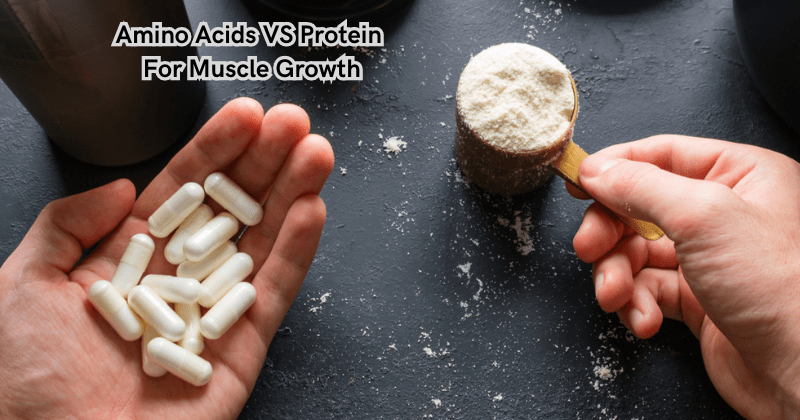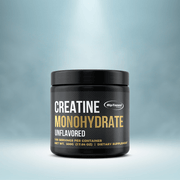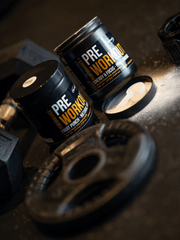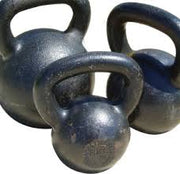Protein is a crucial macronutrient that plays a vital role in muscle growth, repair, and maintenance. It is made up of long chains of smaller building blocks called amino acids. These amino acids are essential for our bodies as they serve various functions such as tissue repair, enzyme production, hormone regulation, and immune system support.
One common misconception is that consuming high amounts of protein automatically leads to muscle growth. However, it is not just about the quantity of protein consumed but also the quality and composition of amino acids in the protein source.
This article will discuss the key differences between amino acids and proteins in terms of their role in muscle growth. We will also explore how specific amino acids benefit muscle development and maintenance.
What are Amino Acids?
Amino acids are organic compounds that serve as the building blocks of proteins. They contain a central carbon atom, an amino group (-NH2), a carboxyl group (-COOH), and a unique side chain (R-group). 20 standard amino acids are essential for human growth and development.
These 20 amino acids can be further classified into three categories based on their structure and function: essential, non-essential, and conditional amino acids.
Our bodies cannot produce essential amino acids, and must be obtained from food sources. Non-essential amino acids can be synthesized by our bodies, while conditional amino acids are non-essential but become essential in certain conditions such as illness or injury.
Amino acids also play a crucial role in various bodily processes, including muscle growth. They are responsible for repairing and rebuilding muscle tissue damaged during physical activity. Muscle cells use amino acids to create new proteins and increase the size and strength of muscles.
Additionally, specific essential amino acids like leucine, isoleucine, and valine make up one-third of our muscle protein. These amino acids are branched-chain amino acids (BCAAs) and play a significant role in muscle protein synthesis, which is crucial for building and maintaining muscles.
Understanding the different types of amino acids and their functions is essential for optimizing muscle growth through proper nutrition and exercise. Now, let's delve into the differences between amino acids and proteins regarding their role in muscle growth.
Amino Acids vs. Proteins: What's the Difference?
The primary difference between amino acids and proteins is their structure and size. As mentioned, amino acids are the building blocks of proteins, which are much larger molecules of long chains of amino acids joined together.
Moreover, while there are only 20 standard amino acids, thousands of different proteins exist in our bodies. Proteins can vary in size and shape depending on the sequence and number of amino acids they contain.
Another significant difference is their absorption and digestion rate. Amino acids from food sources are broken down in the digestive system and absorbed into the bloodstream much faster than whole proteins. This means that consuming amino acids directly can provide quicker results in terms of muscle growth.
However, whole proteins contain a more diverse range of amino acids, which can provide additional health benefits and support various bodily functions. This is why it is crucial to maintain a balance between consuming complete protein sources and individual amino acids for overall health and muscle growth.
Also, while protein intake is often measured in grams, amino acids are typically measured in milligrams. This shows the significant difference in size and quantity between these two nutrients.
How Do Amino Acids Help with Muscle Growth?
As mentioned earlier, amino acids are vital in muscle growth and development. They are responsible for repairing and rebuilding damaged muscle tissue and creating new proteins to increase the size and strength of muscles.
Specific essential amino acids like leucine, isoleucine, and valine are particularly beneficial for muscle growth. These BCAAs stimulate protein synthesis and help prevent muscle breakdown, especially during intense physical activity.
Moreover, amino acids also play a significant role in maximizing the benefits of exercise. They can increase energy levels, improve endurance and recovery, and reduce muscle soreness after workouts.
Additionally, certain amino acids have been shown to boost the production of anabolic hormones like insulin and growth hormone, which are critical for muscle growth.
Can Amino Acids be Taken as Supplements for Muscle Growth?
Yes, amino acids are commonly available in supplement form and can be taken to support muscle growth. BCAAs are one of the most popular forms of amino acid supplements used by athletes and bodybuilders.
However, it is essential to note that these supplements should not be seen as a replacement for whole protein sources. A well-rounded diet that includes complete proteins is crucial for overall health and muscle growth.
Also, while taking amino acid supplements can provide quick results in terms of muscle growth, it is essential to consult a healthcare professional before adding them to your daily routine. They can assess your individual needs and help determine the right dosage and form of amino acid supplements for optimal results.
Should You Consume Amino Acids for Muscle Growth?
In conclusion, amino acids are essential for muscle growth and play a vital role in repairing and building muscles. While proteins are crucial for overall health and provide a wide range of amino acids, taking specific amino acid supplements can also be beneficial for targeting muscle growth.
However, it is crucial to maintain a balance between consuming complete protein sources and individual amino acid supplements for optimal health benefits. Consultation with a healthcare professional is recommended before adding supplements to your daily routine.
In addition, incorporating regular exercise into your routine is crucial for maximizing the effects of amino acids on muscle growth. With the right combination of nutrition and physical activity, you can optimize your muscle growth potential and achieve your fitness goals.
So, make sure to prioritize a well-rounded diet and regular exercise to harness the power of amino acids for muscle growth. Whether it's through whole protein sources or individual supplements, amino acids are a key component in supporting muscle growth and overall health.
Why Amino Acids and Exercise Go Hand in Hand
Amino acids are not only essential for muscle growth but also play a crucial role in exercise performance. As mentioned earlier, amino acids can increase energy levels, improve endurance and recovery, and reduce muscle soreness after workouts.
Moreover, regular physical activity can lead to an increased demand for amino acids in the body. During exercise, muscles undergo constant stress and damage, which requires a steady supply of amino acids for repair and growth.
Furthermore, incorporating resistance training into your exercise routine can further maximize the effects of amino acids on muscle growth. Resistance exercises create tiny tears in the muscle fibers, and amino acids are essential for repairing these tears and promoting new muscle growth.
It is also worth noting that the timing of amino acid consumption is crucial for optimal results. Consuming amino acids before or during exercise can provide a readily available source of fuel and nutrients for your muscles.
Tips for Incorporating Amino Acids into Your Diet
While amino acids can be taken as supplements, it is always best to obtain nutrients from whole food sources whenever possible. Some of the best sources of essential amino acids include meat, fish, eggs, dairy products, and plant-based protein sources like legumes and soy.
To ensure a well-rounded intake of all essential amino acids, it is recommended to consume a variety of these protein sources throughout the day. This can also help prevent any potential deficiencies in specific amino acids.
For those who are unable to obtain enough essential amino acids through their diet, supplements can be used as an alternative. However, it is essential to choose reputable and high-quality supplements from trusted brands.
Additionally, it is crucial to follow the recommended dosage and consult a healthcare professional before adding any supplements to your routine.
As mentioned before, timing is also essential when it comes to amino acid consumption. Consuming a balanced meal or snack with protein and carbohydrates within an hour after exercising can help replenish the body's supply of amino acids and promote muscle growth and repair.
By incorporating these tips into your daily routine, you can optimize your intake of essential amino acids for maximum results in muscle growth and exercise performance.
FAQs
What are the nine essential amino acids, and why are they important for muscle growth?
The nine essential amino acids are histidine, isoleucine, leucine, lysine, methionine, phenylalanine, threonine, tryptophan, and valine. These amino acids are termed 'essential' because the body cannot produce them on its own, and they must be obtained through diet. They are crucial for muscle growth because they play a key role in protein synthesis, the process by which muscles repair and grow.
How does whey protein compare to other protein powders in supporting muscle growth?
Whey protein is often considered one of the best protein powders for supporting muscle growth due to its high biological value and rich content of all the amino acids needed for muscle repair and growth, including a high level of branched-chain amino acids (BCAAs). Its fast absorption rate makes it particularly effective for post-workout recovery.
Are protein supplements necessary for building muscle, or can I get all the amino acids I need from food?
While it is possible to get all the amino acids needed for muscle growth from food, protein supplements such as whey protein and protein powders can be a convenient and efficient way to ensure you meet your protein needs, especially for individuals with high protein requirements, those with dietary restrictions, or anyone finding it challenging to consume enough protein through food alone.
Can consume amino acid supplements alone effectively?
Consuming amino acid supplements can provide targeted support for muscle growth, especially if they include all nine essential amino acids. However, for most people, combining amino acid supplements with complete protein sources, such as whey protein or other protein powders, can offer more comprehensive support for muscle growth and recovery.
Conclusion
In conclusion, amino acids are crucial for muscle growth and exercise performance. They play a vital role in repairing and building muscles, increasing energy levels, improving endurance and recovery, and reducing muscle soreness.
While consuming whole protein sources is recommended, individual amino acid supplements can also be beneficial for targeting specific aspects of muscle growth. However, it is important to maintain a balance and consult a healthcare professional before adding supplements to your routine.
By following these tips, you can harness the power of amino acids to support your muscle growth and overall health goals. So, whether you are an athlete or simply looking to improve your fitness, incorporating amino acids into your diet and exercise routine can be a valuable tool for achieving your desired results.
















































































































